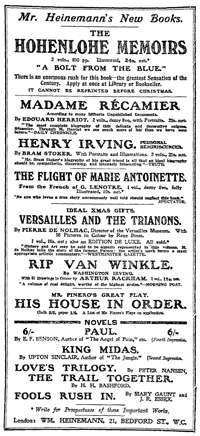


Personal Reminiscences of Henry Irvingwas Bram Stoker's fourth major piece of nonfiction. This set of books is a biography of the English stage actor Henry Irving (February 6, 1838 – October 13, 1905). It was first published in the UK as a two-volume set in October 1906 by William Heinemann, London. The books themselves are 372 (Vol.1) and 388 (Vol.2) page hardcover volumes with red cloth covers stamped on the front panels in gold. It was first published in the US as a two-volume set in October 1906 by Macmillan Company, New York. The books themselves are 372 (Vol.1) and 388 (Vol.2) page hardcover volumes with red cloth covers stamped on the front panels in gold. In October 1907 it was re-released by Heinemann in a single volume as a "Revised and Cheaper Edition." The book itself is a 480 page hardcover with a red cloth cover stamped on the front panels in black.William Heinemann Ltd. (publisher) First edition book cover

Heinemann, London, 1906 Criticism When it was first published Personal Reminiscences of Henry Irving was criticized by some critics for containing too much information on Stoker. According to the New York Times Saturday Review of Books in the October 20, 1906 issue of The New York Times, New York, "Almost every one criticises it here because, though it is called a book about Irving, it is really a book about Stoker and Irving. There is something naively appealing in the way Mr. Stoker seems to suppose the public will be equally interested in himself and the great actor." Rather ironically, most modern readers are interested in Personal Reminiscences of Henry Irving for this very reason. Short story publication Three very short stories from this book have been expanded, given given new titles and republished as a collection under the name "Midnight Tales". In 1990 they appeared in the short story collection Midnight Tales, Peter Owen Publishers, London. Availability This book is available as a: The review is available as a: It can also be purchased online as a: Early publication notice

Daily Mail, London, December 1, 1906 |
